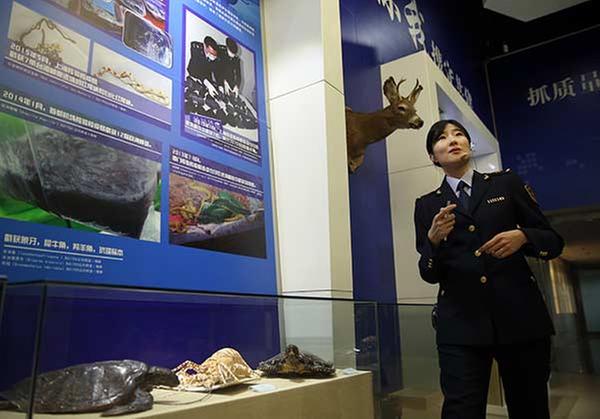Number of intercepted invasive species surges

 |
| A guide talks about cases of invasive species intercepted by the Beijing Entry-Exit Inspection and Quarantine Bureau in recent years on Tuesday.Zou Hong / China Daily |
Exit-entry inspection and quarantine officers in Beijing stopped more than 10,000 consignments of banned animals, plants and other items between January and March, an increase of 35 percent compared with the same period last year.
A total of 667 consignments contained harmful pests, such as seed weevil, a near fourfold increase, according to the Beijing Entry-Exit Inspection and Quarantine Bureau.
With the rapid development of cross-border e-commerce and the increasing popularity of cross-border tourism, authorities face challenges in ensuring biosafety at border ports, Chong Yan, the bureau's director of animal and plant inspection supervision, said on Tuesday.
"With a rapid increase in the number of cross-border passengers and parcels, inspection and quarantine authorities have intercepted more animals and plants and related products illegally carried or posted to China," Chong said.
"Carrying animals and plants from overseas brings a high risk of introducing diseases and pests, while some of the plants and animals may become invasive species and cause irrevocable damage to ecological safety."
Of the animals and plants intercepted in the first three months of the year, there were three red slender loris and three dormice, which were all brought by a passenger from Thailand as pets, Chong said.
The bureau has intensified inspection efforts in recent years, such as establishing more test labs at major ports of entry, and adopting a comprehensive inspection model that integrates scanning equipment and sniffer dogs, he added.
China forbids a number of species from being carried or mailed into the country, including most live animals, fresh fruits and vegetables, to prevent invasion of harmful species and diseases.
China is among the countries that have suffered most from invasive species, the bureau said.
Among the species that have caused China significant losses is the fall webworm, which was first found in the country in Dandong, Liaoning province, in 1979. The pest, which caused damage to forests, has since spread to other provinces and municipalities in northern and central regions, including Beijing and Hebei province, the bureau said.
Entry-exit inspection and quarantine authorities across China intercepted 6,305 kinds of harmful species last year, compared with 5,985 in 2015, with 26 of them being intercepted in China for the first time, according to the General Administration of Quality Supervision, Inspection and Quarantine.
wangxiaodong@chinadaily.com.cn
- 300,000-year-old wooden tools found
- China to strengthen disaster management
- TCM foodstuffs help to sweeten bitter pill
- Qingdao institute offers a new window to study, understand SCO states
- New scenic area in Shenyang opens in time for lotus blooming season
- Shanghai airports offer storage service for prohibited power banks





































